by David McHugh and David Keyton

Permanent Secretary of the Royal Swedish Academy of Sciences Goran K Hansson, center, announces the 2021 Nobel prize for economics, flanked by members of the Royal Swedish Academy of Sciences Peter Fredriksson, left, and Eva Mork, during a press conference at the Royal Swedish Academy of Sciences, in Stockholm, Sweden, Monday, Oct. 11, 2021. From left on the screen above are the winners David Card of the University of California at Berkeley; Joshua Angrist from the Massachusetts Institute of Technology; and Guido Imbens from Stanford University.

Card also found that incomes of those who are native born in a country can benefit from new immigrants, while immigrants who arrived earlier are the ones at risk of being negatively affected.
Angrist and Imbens won their half of the award for working out the methodological issues that allow economists to draw solid conclusions about cause and effect even where they cannot carry out studies according to strict scientific methods.
Speaking by phone from his home in Massachusetts, Imbens told reporters that he had been asleep when the call came.

Credit: Claudio Bresciani/TT via AP
A U.S.-based economist won the Nobel prize for economics Monday for pioneering research that showed an increase in minimum wage does not lead to less hiring and immigrants do not lower pay for native-born workers, challenging commonly held ideas. Two others shared the award for creating a way to study these types of societal issues.
Canadian-born David Card of the University of California, Berkeley, was awarded one half of the prize for his research on how minimum wage, immigration and education affect the labor market, while the other half was shared by Joshua Angrist from the Massachusetts Institute of Technology and Dutch-born Guido Imbens from Stanford University for their framework for studying issues that can't rely on traditional scientific methods.
The Royal Swedish Academy of Sciences said the three have "completely reshaped empirical work in the economic sciences."
"Card's studies of core questions for society and Angrist and Imbens' methodological contributions have shown that natural experiments are a rich source of knowledge," said Peter Fredriksson, chair of the Economic Sciences Committee. "Their research has substantially improved our ability to answer key causal questions, which has been of great benefit for society."
Card worked on research that used restaurants in New Jersey and in eastern Pennsylvania to measure the effects of increasing the minimum wage. He studied what happened when New Jersey raised its minimum wage from $4.25 to $5.05, using restaurants in bordering eastern Pennsylvania as a comparison group.
A U.S.-based economist won the Nobel prize for economics Monday for pioneering research that showed an increase in minimum wage does not lead to less hiring and immigrants do not lower pay for native-born workers, challenging commonly held ideas. Two others shared the award for creating a way to study these types of societal issues.
Canadian-born David Card of the University of California, Berkeley, was awarded one half of the prize for his research on how minimum wage, immigration and education affect the labor market, while the other half was shared by Joshua Angrist from the Massachusetts Institute of Technology and Dutch-born Guido Imbens from Stanford University for their framework for studying issues that can't rely on traditional scientific methods.
The Royal Swedish Academy of Sciences said the three have "completely reshaped empirical work in the economic sciences."
"Card's studies of core questions for society and Angrist and Imbens' methodological contributions have shown that natural experiments are a rich source of knowledge," said Peter Fredriksson, chair of the Economic Sciences Committee. "Their research has substantially improved our ability to answer key causal questions, which has been of great benefit for society."
Card worked on research that used restaurants in New Jersey and in eastern Pennsylvania to measure the effects of increasing the minimum wage. He studied what happened when New Jersey raised its minimum wage from $4.25 to $5.05, using restaurants in bordering eastern Pennsylvania as a comparison group.

A April 17, 2015 file photo shows a gold Nobel Prize medal. The Nobel Prize for Economics will be announced on Monday Oct. 11, 2021.
Credit: AP Photo/Fernando Vergara, File
Contrary to previous studies, he and his late research partner Alan Krueger found that an increase in the minimum wage had no effect on the number of employees. Card later did further work on the issue. Overall, the work concluded that the negative effects of increasing the minimum wage are small and significantly smaller than believed 30 years ago, the Nobel committee said.
Card also found that incomes of those who are native born in a country can benefit from new immigrants, while immigrants who arrived earlier are the ones at risk of being negatively affected.
Angrist and Imbens won their half of the award for working out the methodological issues that allow economists to draw solid conclusions about cause and effect even where they cannot carry out studies according to strict scientific methods.
Speaking by phone from his home in Massachusetts, Imbens told reporters that he had been asleep when the call came.

A Tuesday, Dec. 8, 2020 file photo of a Nobel Prize medal. The Nobel Prize for Economics will be announced on Monday Oct. 11, 2021.
Credit: AP Photo/Jacquelyn Martin, File
"I was just absolutely stunned then to get a telephone call" he said. "And then I was just absolutely thrilled to hear the news, a particular kind of hearing that I got to share this with Josh Angrist and and David Card were both very good friends of mine."
The award comes with a gold medal and 10 million Swedish kronor (over $1.14 million).
Unlike the other Nobel prizes, the economics award wasn't established in the will of Alfred Nobel but by the Swedish central bank in his memory in 1968, with the first winner selected a year later. It is the last prize announced each year.
Last week, the 2021 Nobel Peace Prize was awarded to journalists Maria Ressa of the Philippines and Dmitry Muratov of Russia for their fight for freedom of expression in countries where reporters have faced persistent attacks, harassment and even murder.

"I was just absolutely stunned then to get a telephone call" he said. "And then I was just absolutely thrilled to hear the news, a particular kind of hearing that I got to share this with Josh Angrist and and David Card were both very good friends of mine."
The award comes with a gold medal and 10 million Swedish kronor (over $1.14 million).
Unlike the other Nobel prizes, the economics award wasn't established in the will of Alfred Nobel but by the Swedish central bank in his memory in 1968, with the first winner selected a year later. It is the last prize announced each year.
Last week, the 2021 Nobel Peace Prize was awarded to journalists Maria Ressa of the Philippines and Dmitry Muratov of Russia for their fight for freedom of expression in countries where reporters have faced persistent attacks, harassment and even murder.

From left, on the screen are the winners of the 2021 Nobel prize for economics; David Card of the University of California at Berkeley; Joshua Angrist from the Massachusetts Institute of Technology; and Guido Imbens from Stanford University, announced during a press conference at the Royal Swedish Academy of Sciences, in Stockholm, Sweden, Monday, Oct. 11, 2021. Credit: Claudio Bresciani/TT via AP
Ressa was the only woman honored this year in any category.
The Nobel Prize for literature was awarded to U.K.-based Tanzanian writer Abdulrazak Gurnah, who was recognized for his "uncompromising and compassionate penetration of the effects of colonialism and the fate of the refugee."
The prize for physiology or medicine went to Americans David Julius and Ardem Patapoutian for their discoveries into how the human body perceives temperature and touch.
Three scientists won the physics prize for work that found order in seeming disorder, helping to explain and predict complex forces of nature, including expanding our understanding of climate change.
Benjamin List and David W.C. MacMillan won the chemistry prize for finding an easier and environmentally cleaner way to build molecules that can be used to make compounds, including medicines and pesticides.
Ressa was the only woman honored this year in any category.
The Nobel Prize for literature was awarded to U.K.-based Tanzanian writer Abdulrazak Gurnah, who was recognized for his "uncompromising and compassionate penetration of the effects of colonialism and the fate of the refugee."
The prize for physiology or medicine went to Americans David Julius and Ardem Patapoutian for their discoveries into how the human body perceives temperature and touch.
Three scientists won the physics prize for work that found order in seeming disorder, helping to explain and predict complex forces of nature, including expanding our understanding of climate change.
Benjamin List and David W.C. MacMillan won the chemistry prize for finding an easier and environmentally cleaner way to build molecules that can be used to make compounds, including medicines and pesticides.
Canadian-born David Card named as Nobel prize winner in economics
By Simon Johnson and Niklas Pollard Reuters
WATCH: David Card, Canadian-born economist, named joint winner of Nobel Prize in economics
Economists David Card, Joshua Angrist and Guido Imbens won the 2021 Nobel economics prize on Monday for pioneering “natural experiments” to show real-world economic impacts in areas from the U.S. fast-food sector to migration from Castro-era Cuba.
Unlike in medicine or other sciences, economists cannot conduct rigidly controlled clinical trials. Instead, natural experiments use real-life situations to study impacts on the world, an approach that has spread to other social sciences.
“Their research has substantially improved our ability to answer key causal questions, which has been of great benefit to society,” says Peter Fredriksson, chair of the Economic Sciences Prize Committee.
Past Nobel Economics prizes have been dominated by U.S. institutions and this was no exception. Canada-born Card currently works at the University of California, Berkeley; Angrist at Massachusetts Institute of Technology; and Dutch-born Imbens at Stanford University.
Questions about cause and effect
One experiment by Card on the impact on the fast-food sector of a minimum wage increase in the U.S. state of New Jersey in the early 1990s prompted a review of the conventional wisdom that such increases should always lead to falls in employment.
Another studied the impact of a move by Fidel Castro in 1980 to allow all Cubans who wished to leave the country to do so. Despite high ensuing migration to Miami, Card found no negative wage or labor effects for Miami residents with low levels of education.
“Many important questions are about cause and effect. Will people become healthier if their income increases. ..do lockdowns reduce the spread of infections?” Nobel panelist Eva Mörk said.
“This year’s laureates have shown that it is still possible to answer these broad questions about cause and effects and the way to do that is to use natural experiments.”
2:20Alberta-based scientist awarded Nobel Prize for discovering hepatitis CAlberta-based scientist awarded Nobel Prize for discovering hepatitis C – Oct 5, 2020
Mörk, economics professor at Uppsala University, noted that the pandemic had created scope for a good natural experiment on education outcomes due to the varying disruption caused to children in different school years but whose birth times in some cases were only separated by hours.
“So here, nature has given us an experiment that makes it possible to answer questions that otherwise would not have been possible to answer,” she said.
'Absolutely stunned'
The committee noted that natural experiments were difficult to interpret, but that Angrist and Imbens had in the mid-1990s solved methodological problems to show that precise conclusions about cause and effect can be drawn from them.
“I was just absolutely stunned to get a telephone call, then I was just absolutely thrilled to hear the news,” Imbens said on a call with reporters in Stockholm, adding he was thrilled to share the prize with two of his good friends. Angrist was best man at his wedding.
The prize, formally known as the Sveriges Riksbank Prize in Economic Sciences in Memory of Alfred Nobel, is the last of this year’s crop of Nobels and sees the winners share a sum of 10 million Swedish crowns ($1.14 million).
The prestigious prizes for achievements in science, literature and peace were created and funded in the will of Swedish dynamite inventor and wealthy businessman Alfred Nobel.
They have been awarded since 1901, though the economics prize – created through a donation from Sweden’s central bank on its 300th anniversary – is a later addition that was first handed out in 1969.
While the economics award has tended to live in the shadow of the often already famous winners of the prizes for peace and literature, laureates over the years include a number of hugely influential economists, such as the Austrian-British Friedrich August von Hayek and American Milton Friedman.
By Simon Johnson and Niklas Pollard Reuters
Posted October 11, 2021
WATCH: David Card, Canadian-born economist, named joint winner of Nobel Prize in economics
Economists David Card, Joshua Angrist and Guido Imbens won the 2021 Nobel economics prize on Monday for pioneering “natural experiments” to show real-world economic impacts in areas from the U.S. fast-food sector to migration from Castro-era Cuba.

Unlike in medicine or other sciences, economists cannot conduct rigidly controlled clinical trials. Instead, natural experiments use real-life situations to study impacts on the world, an approach that has spread to other social sciences.
“Their research has substantially improved our ability to answer key causal questions, which has been of great benefit to society,” says Peter Fredriksson, chair of the Economic Sciences Prize Committee.
Past Nobel Economics prizes have been dominated by U.S. institutions and this was no exception. Canada-born Card currently works at the University of California, Berkeley; Angrist at Massachusetts Institute of Technology; and Dutch-born Imbens at Stanford University.
Questions about cause and effect
One experiment by Card on the impact on the fast-food sector of a minimum wage increase in the U.S. state of New Jersey in the early 1990s prompted a review of the conventional wisdom that such increases should always lead to falls in employment.
Another studied the impact of a move by Fidel Castro in 1980 to allow all Cubans who wished to leave the country to do so. Despite high ensuing migration to Miami, Card found no negative wage or labor effects for Miami residents with low levels of education.
“Many important questions are about cause and effect. Will people become healthier if their income increases. ..do lockdowns reduce the spread of infections?” Nobel panelist Eva Mörk said.
“This year’s laureates have shown that it is still possible to answer these broad questions about cause and effects and the way to do that is to use natural experiments.”
2:20Alberta-based scientist awarded Nobel Prize for discovering hepatitis CAlberta-based scientist awarded Nobel Prize for discovering hepatitis C – Oct 5, 2020
Mörk, economics professor at Uppsala University, noted that the pandemic had created scope for a good natural experiment on education outcomes due to the varying disruption caused to children in different school years but whose birth times in some cases were only separated by hours.
“So here, nature has given us an experiment that makes it possible to answer questions that otherwise would not have been possible to answer,” she said.
'Absolutely stunned'
The committee noted that natural experiments were difficult to interpret, but that Angrist and Imbens had in the mid-1990s solved methodological problems to show that precise conclusions about cause and effect can be drawn from them.
“I was just absolutely stunned to get a telephone call, then I was just absolutely thrilled to hear the news,” Imbens said on a call with reporters in Stockholm, adding he was thrilled to share the prize with two of his good friends. Angrist was best man at his wedding.
The prize, formally known as the Sveriges Riksbank Prize in Economic Sciences in Memory of Alfred Nobel, is the last of this year’s crop of Nobels and sees the winners share a sum of 10 million Swedish crowns ($1.14 million).
The prestigious prizes for achievements in science, literature and peace were created and funded in the will of Swedish dynamite inventor and wealthy businessman Alfred Nobel.
They have been awarded since 1901, though the economics prize – created through a donation from Sweden’s central bank on its 300th anniversary – is a later addition that was first handed out in 1969.
While the economics award has tended to live in the shadow of the often already famous winners of the prizes for peace and literature, laureates over the years include a number of hugely influential economists, such as the Austrian-British Friedrich August von Hayek and American Milton Friedman.
No comments:
Post a Comment